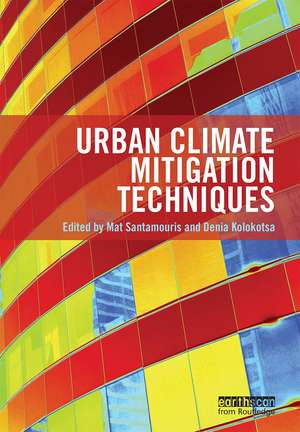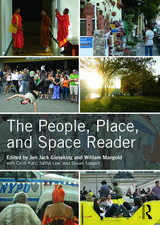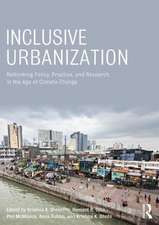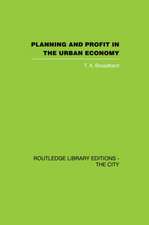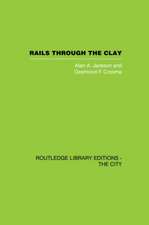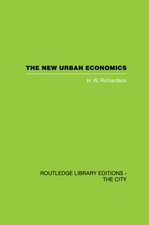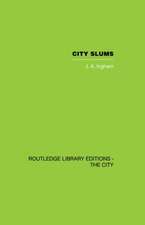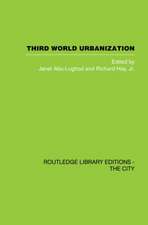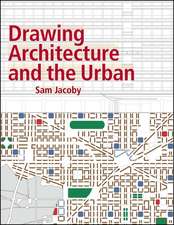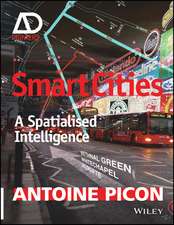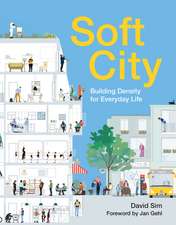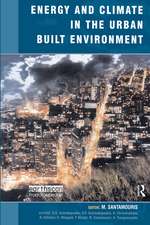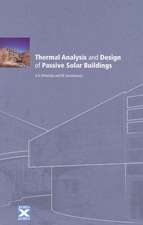Urban Climate Mitigation Techniques
Editat de Mat Santamouris, Denia Kolokotsaen Limba Engleză Paperback – 30 sep 2020
Including tools for evaluation and a comparative analysis, this book addresses anthropogenic heat, green areas, cool materials and pavements, outdoor shading structures, evaporative cooling and earth cooling. Case studies demonstrate the success and applicability of these measures in various cities throughout the world.
Useful for urban designers, architects and planners, Urban Climate Mitigation Techniques is a step by step tour of the innovative technologies improving our urban climate, providing a holistic approach supported by well-established quantitative examples.
| Toate formatele și edițiile | Preț | Express |
|---|---|---|
| Paperback (1) | 215.19 lei 6-8 săpt. | |
| Taylor & Francis – 30 sep 2020 | 215.19 lei 6-8 săpt. | |
| Hardback (1) | 769.51 lei 6-8 săpt. | |
| Taylor & Francis – 21 ian 2016 | 769.51 lei 6-8 săpt. |
Preț: 215.19 lei
Preț vechi: 258.26 lei
-17% Nou
Puncte Express: 323
Preț estimativ în valută:
41.18€ • 42.99$ • 34.08£
41.18€ • 42.99$ • 34.08£
Carte tipărită la comandă
Livrare economică 05-19 aprilie
Preluare comenzi: 021 569.72.76
Specificații
ISBN-13: 9780367669980
ISBN-10: 0367669986
Pagini: 222
Dimensiuni: 174 x 246 x 13 mm
Greutate: 0.41 kg
Ediția:1
Editura: Taylor & Francis
Colecția Routledge
Locul publicării:Oxford, United Kingdom
ISBN-10: 0367669986
Pagini: 222
Dimensiuni: 174 x 246 x 13 mm
Greutate: 0.41 kg
Ediția:1
Editura: Taylor & Francis
Colecția Routledge
Locul publicării:Oxford, United Kingdom
Public țintă
Professional Practice & DevelopmentCuprins
1. Facing The Urban heat island phenomenon – A new challenge for urban designers—Mattheos Santamouris 2. Understanding and reducing the anthropogenic heat—Nektarios Chrysoulakis 3. Valuing green spaces as a heat mitigation technique—Prof Wong Nyuk Hien 4. Mitigating the urban heat with cool materials for the buildings' fabric—Afroditi Synnefa 5. Cooling the cities with cool pavements—Mattheos Santamouris 6. The effect of the evaporative cooling, techniques on reducing urban heat—Servanto Alvarez 7. Exploiting earth cooling to mitigate heat on cities' scale—Stamatis Zoras 8. The role of spatial planning—Maria Kaltsa 9. Tools for the evaluation of the mitigation techniques—Denia Kolokotsa 10. Case studies—Denia Kolokotsa
Notă biografică
Denia Kolokotsa is Assistant Professor at the Technical University of Crete; Lab Director of Energy Management at the Built Environment Research Lab (www.ember.tuc.gr); Board Director of the European Cool Roofs Council (http://coolroofcouncil.eu/); Editor-in-Chief of Advances in Building Energy Research; and Editorial Board Member of Energy and Buildings and Renewable Energy.
She has participated in more than 30 national and EU projects with the main subject of the energy management and operational efficiency of buildings. She has coordinated two EU projects (EEBD, targeting vocational training structures concerning EPBD at an EU level) and national projects, and she is member of the leading team for the FP7 project PEBBLE. She has organized two sessions in previous REHVA conferences concerning EPBD vocational training issues. She has also participated in numerous research projects (FP5, FP7, Horizon, etc.), and she is the author of more than 70 papers that have been published in scientific journals and presented conferences.
Her research interests include energy management and energy efficiency in the built and urban environment, neural networks and fuzzy logic technology, advanced optimization theory and applications, and decision support systems in energy modelling and automation.
Mattheos Santamouris is Professor of Energy Physics at the University of Athens, Greece, and Visiting Professor at the Cyprus Institute, London Metropolitan University, UK, Tokyo Polytechnic University, Japan, Bolzano University, Italy, Brunel University, UK, and the National University of Singapore.
He is also Director of the Laboratory of Building Energy Research at the University of Athens; Editor-in-Chief of Energy and Buildings, past Editor-in-Chief of the Journal of Advances in Building Energy Research; Associate Editor of the Solar Energy Journal; and is a current or past Editorial Board Member of the International Journal of Solar Energy, Journal of Buildings and Environment, Journal of Sustainable Energy, Journal of Low Carbon Technologies, Journal of Open Construction and Building Technology, Sustainable Cities and Society, and Journal of Ventilation.
He is editor of the Routledge series, BEST (Buildings, Energy and Solar Technologies); editor and author of 12 international books on topics related to heat islands, solar energy, and energy conservation in buildings; guest editor of 12 special issues of various scientific journals; coordinator of many international research programs; and author of almost 210 scientific papers published in peer-reviewed international scientific journals. He has served as a reviewer of research projects in 14 countries including the USA, UK, France, Germany, Canada, and Sweden.
She has participated in more than 30 national and EU projects with the main subject of the energy management and operational efficiency of buildings. She has coordinated two EU projects (EEBD, targeting vocational training structures concerning EPBD at an EU level) and national projects, and she is member of the leading team for the FP7 project PEBBLE. She has organized two sessions in previous REHVA conferences concerning EPBD vocational training issues. She has also participated in numerous research projects (FP5, FP7, Horizon, etc.), and she is the author of more than 70 papers that have been published in scientific journals and presented conferences.
Her research interests include energy management and energy efficiency in the built and urban environment, neural networks and fuzzy logic technology, advanced optimization theory and applications, and decision support systems in energy modelling and automation.
Mattheos Santamouris is Professor of Energy Physics at the University of Athens, Greece, and Visiting Professor at the Cyprus Institute, London Metropolitan University, UK, Tokyo Polytechnic University, Japan, Bolzano University, Italy, Brunel University, UK, and the National University of Singapore.
He is also Director of the Laboratory of Building Energy Research at the University of Athens; Editor-in-Chief of Energy and Buildings, past Editor-in-Chief of the Journal of Advances in Building Energy Research; Associate Editor of the Solar Energy Journal; and is a current or past Editorial Board Member of the International Journal of Solar Energy, Journal of Buildings and Environment, Journal of Sustainable Energy, Journal of Low Carbon Technologies, Journal of Open Construction and Building Technology, Sustainable Cities and Society, and Journal of Ventilation.
He is editor of the Routledge series, BEST (Buildings, Energy and Solar Technologies); editor and author of 12 international books on topics related to heat islands, solar energy, and energy conservation in buildings; guest editor of 12 special issues of various scientific journals; coordinator of many international research programs; and author of almost 210 scientific papers published in peer-reviewed international scientific journals. He has served as a reviewer of research projects in 14 countries including the USA, UK, France, Germany, Canada, and Sweden.
Recenzii
"This book compiles a useful collection of information about urban climate mitigation. Organized in a way that makes perfect sense, from techniques, to modeling, to implementation and case studies, this volume comes at the right time to help urban developers integrate urban climate adaptation into their daily business, spreading more sustainable urban planning around the globe." –Marjorie Musy, Deputy Director, Institut de Recherche des Sciences et Techniques de la Ville (IRSTV)
"With the world’s largest cities now warming at double the rate of the planet as a whole, it is imperative that municipal governments work to lessen the public health risk of extreme heat. This edited volume represents the first comprehensive assessment of the tools available today to lessen heat risk and, as such, provides a much needed roadmap to tackle what may be the most significant challenge presented by climate change to the world’s population: How to protect city-dwellers from a rising tide of extreme heat." –Brian Stone, Professor of City and Regional Planning, Georgia Institute of Technology
"With the world’s largest cities now warming at double the rate of the planet as a whole, it is imperative that municipal governments work to lessen the public health risk of extreme heat. This edited volume represents the first comprehensive assessment of the tools available today to lessen heat risk and, as such, provides a much needed roadmap to tackle what may be the most significant challenge presented by climate change to the world’s population: How to protect city-dwellers from a rising tide of extreme heat." –Brian Stone, Professor of City and Regional Planning, Georgia Institute of Technology
Descriere
The urban climate is continuously deteriorating. Urban heat lowers the quality of urban life, increases the energy needs at the urban scale, and affects the urban socio-economy. However, there are steps that can be taken to mitigate this situation. This book presents a series of innovative technologies as well as examples of best practices for t
